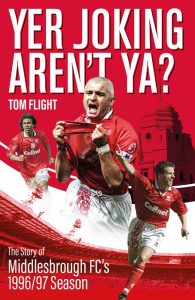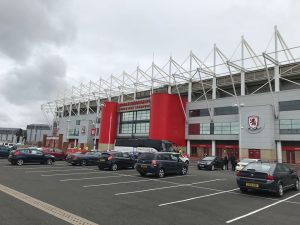Interview with Tom Flight, author of ‘Yer Joking Aren’t Ya? – The Story of Middlesbrough FC’s 1996/97 Season’
 As football in the Premier League and the Championship prepares to return after the COVID-19 outbreak, titles, promotions, and relegations will be fought for behind closed doors. For Middlesbrough, the remaining nine games are vital as they look to ensure their survival in the Championship. Ahead of this unusual end of season, FBR caught up with Tom Flight (TF) who has released a book about an incredible season in the Boro’s history.
As football in the Premier League and the Championship prepares to return after the COVID-19 outbreak, titles, promotions, and relegations will be fought for behind closed doors. For Middlesbrough, the remaining nine games are vital as they look to ensure their survival in the Championship. Ahead of this unusual end of season, FBR caught up with Tom Flight (TF) who has released a book about an incredible season in the Boro’s history.
(FBR): Congratulations on the publication of ‘Yer Joking Aren’t Ya?’ which tells the story of the 1996/1997 season at Middlesbrough. Can you tell us a bit about your affinity with the club?
(TF): Thank you very much. My family moved to Teesside when I was two, so I grew up with them being my local team. My dad wasn’t a particularly huge football fan, but he got swept away with the optimism and all the excitement when Bryan Robson became manager. We started going to games during the 1994/95 season, the year we got promoted, and then we got a season ticket the following season which we kept for years. In the mid-90s Middlesbrough was an absolutely amazing place to be a young football fan.
(FBR): The 1980s were a difficult period financially for the club, but Middlesbrough were promoted back to the Premier League in 1994/1995, what were the feelings around the club at the time?
(TF): I remember there being a distinct buzz all season about that promotion side. I imagine the events of 1986 were still raw, but what that young side did was such an incredible achievement. When Steve Gibson became chairman in 1994 and appointed Bryan Robson, I think it felt like Boro’ were finally going to go to the next level.
(FBR): Bryan Robson was brought in as player-manager in 1994, in his first experience in a managerial role, what was the reaction to his arrival and his time at Middlesbrough?
(TF): I think it was seen as a massive coup. When Robson retired from playing for Manchester United, he was approached by a number of clubs, and Ron Atkinson was trying to bring him in as assistant at Aston Villa. Terry Venables had picked him for the assistant job for England, so Robson was definitely seen as an up-and-coming manager.
 (FBR): In the first season back in the Premier League, Middlesbrough finished 12th, was there a sense of optimism at the start of the 1996/1997 season?
(FBR): In the first season back in the Premier League, Middlesbrough finished 12th, was there a sense of optimism at the start of the 1996/1997 season?
(TF): I’ve never experienced anything close to the optimism that I felt as a young Middlesbrough fan in the summer of 1996. Middlesbrough had started well in the 95/96 campaign, but they dropped off after Christmas, but that season really felt like a prequel ahead of what was going to happen the following season. The transfer of Juninho in October 1995 had been ground-breaking, but when we signed Fabrizio Ravanelli it was unbelievable.
(FBR): Can you tell us a bit about the story of the 1996/1997 season and its inspiration for the book?
(TF): I’ve always thought it was one of the most incredible stories of the Premier League era. How a side like Middlesbrough was able to attract top stars and compete financially with top sides in Europe was impressive in itself. But it was quite remarkable how the season unravelled. It was a campaign full of crazy stories, like Brazilian midfielder Emerson going AWOL for a month, and the debacle at Ewood Park where Boro’ were deducted three points for failing to show up for a match. At the same time, Middlesbrough were also embarking on two epic cup finals and two Wembley appearances. That one season produced more memories and incredible moments than you would normally hope to see in a decade.
(FBR): In Ravanelli and Juninho, Middlesbrough had two of the league’s most mercurial figures, both of whom were amongst the top scorers in the Premier League in 1996/1997, how did this mesh with Middlesbrough’s falling to relegation?
(TF): At the start of the season, I think Boro’ fans were just so excited by the fact we had two genuine world-class players in Ravanelli and Juninho, plus Emerson in midfield, but it soon became apparent that the side was horribly unbalanced. The defence was just a mess, not helped by a pretty severe injury crisis. Ravanelli in particular found the defence exasperating and was slagging his own side off to Italian newspapers during the season. Robson made a couple of late signings in getting goalkeeper Mark Schwarzer and Italian defender Gianluca Festa which massively improved the side at the back, but the damage had already been done.
(FBR): How is the 1996/1997 season reflected back on now? Has there been a lasting effect at all?
(TF): I’ve actually had several people message me saying that they’ve purchased the book but said they can’t bring themselves to read it and revisit those memories. Over 20 years later it still feels “too soon.” Rob Nicholls who is editor for the Middlesbrough Fanzine Fly Me To The Moon has said that Boro’ fans “lost the ability to truly let themselves go” after this season. There was so much drama and emotion and memorable moments, but for it all to end in relegation and two cup final defeats was just completely crushing. It was also a major sliding-doors moment. If we had been able to stay up, there were all sorts of rumours about who we were going to sign next (Gabriel Batistuta and Roberto Carlos were serious targets), but relegation dashed all those dreams. I think the thought of what might have been still lingers with a lot of fans today.
(FBR): Juninho left at the end of that ‘96/97 season, only to return for spells in 1999/2000 and in 2002 to 2004 and is still very much synonymous with Middlesbrough. How important was he for the club and where does he rank for you amongst the best players the team has seen?
(TF): He is the best player I’ve ever seen in a Middlesbrough shirt. When I started researching the book and watched some of the matches, I was fully prepared for my memories to be steeped in nostalgia and maybe find he wasn’t as good as I thought. To be honest, he was far better than I remembered. I’m not exaggerating when I say he could pick the ball up literally anywhere on the pitch and you’d be on the edge of your seat. He would glide past players with such grace and ease, but he was always direct, never showing off. It often felt like he was taking on the opposition almost singlehandedly. If his teammates got the ball, they would just give it straight back to him. Obviously, he was tiny, but his balance was incredible. The game is significantly less physical now, I think if he played in the modern era, he’d be unstoppable.
(FBR): Do you still follow Middlesbrough today and if so, prior to the coronavirus pandemic, how would you view their season and their ambitions for the future?
(TF): Yes, I still follow Middlesbrough. I live in the States now though, so I’m always watching or listening to games on Saturday mornings. When I get home to the UK, I usually get to a game. I’m desperate for Jonathan Woodgate to do well, but obviously we have struggled a lot this season. There have been glimpses where we’ve looked promising, and a few of the goals we’ve scored this season have been some of the best I’ve seen in years, but I think we are also the lowest scorers in the league, and the defence has hardly been covering themselves in glory. We’re definitely in a process of rebuilding, so I’m just hoping we can just stay up and then perhaps we’ll see Boro’ evolve into a more consistent side next season.
As for the future, the footballing world has changed so much. The gap between the elite and the rest is so vast now it’s almost impossible to imagine we’ll ever see players of the calibre of Juninho playing at the Riverside again. I just hope Steve Gibson is able to turn things round and get us back in the Premier League one day, and maybe have one more shot at a trophy. He’s given so much to the club, it would be great if he could have one last shot at glory.
(FBR): It’s impossible not to mention the current situation, with football suspended in England, and generally worldwide, for the last couple of months, with plans for the resumption in mid-June, how much have you missed it and what are you most looking forward to when it returns?
(TF): I’ve definitely missed it. Not only the end of the regular season, but I was also looking forward to the Euros and going to some MLS games here in the States. But at the same time I’ve quite enjoyed the excuse to indulge in looking back at classic matches and past seasons. I wrote this book because I love football nostalgia, particularly from the 90s, so I always enjoy looking back.
(FBR): And finally if you could pick one former Middlesbrough player to slot into the current team who would it be and why?
(TF): Juninho. He would be worth a fair bit in today’s market though.
Jade Craddock (for FBR)




